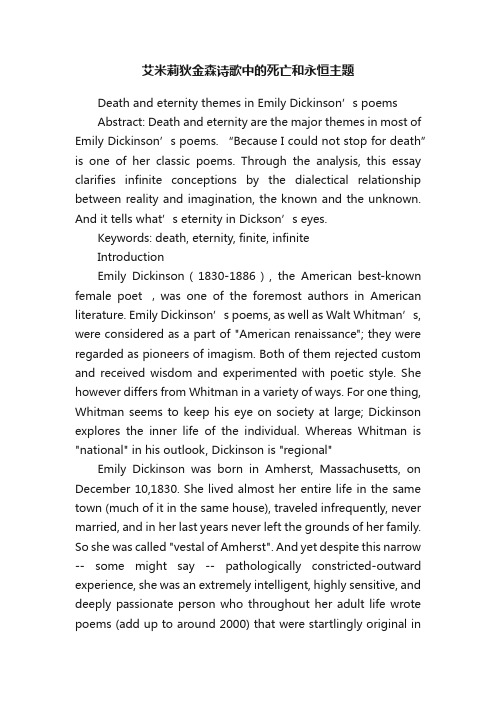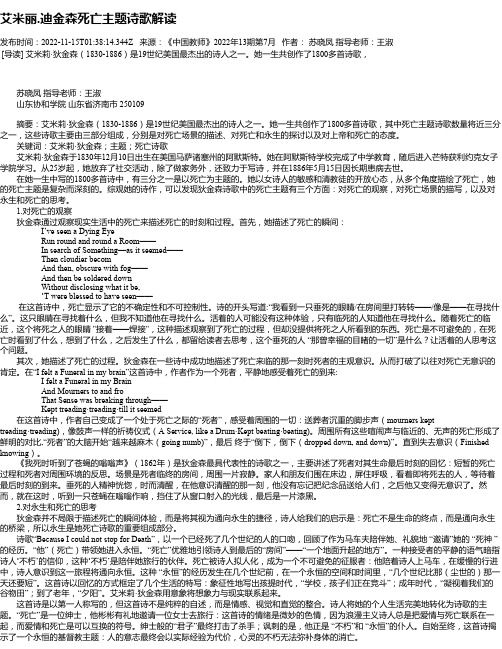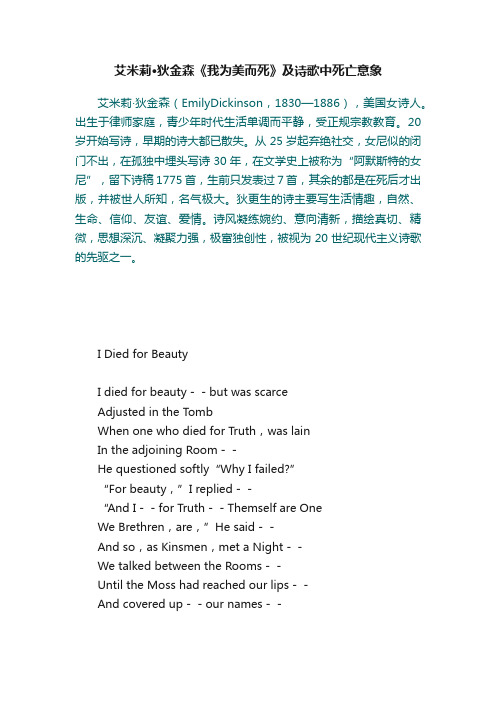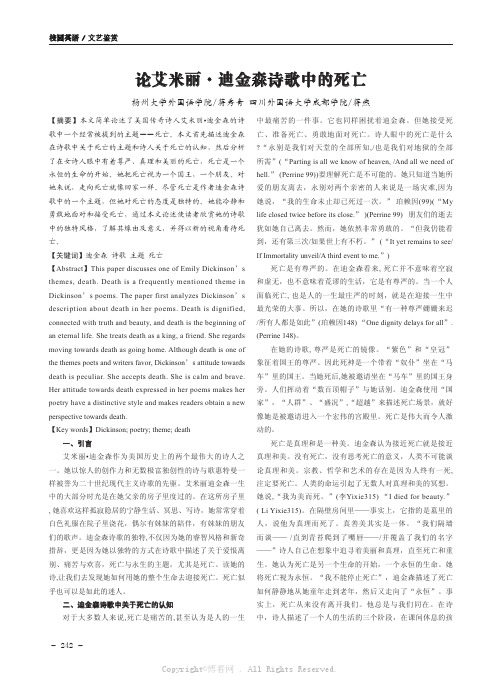艾米莉狄金森诗歌中的死亡和永恒主题
艾米莉·狄金森死亡与永生主题诗歌的矛盾

文史博览(理论)Culture And History Vision(Theory)2016年8月Aug. 2016艾米莉·狄金森死亡与永生主题诗歌的矛盾李 慧[摘 要] 狄金森是美国十九世纪著名的女诗人。
她以清新洗练的笔触,抒写了许多关于死亡与永生主题的诗歌。
狄金森成长的社会环境,传统思想与新思想交替影响所形成的文化氛围,造成诗人复杂的精神世界。
本文作者意图结合女诗人的人生经历及社会历史背景,对所选的两首诗歌进行文本分析,揭示在其诗作中所反映出的矛盾,分析导致这些矛盾产生的原因,去探寻诗人内心世界的神秘和她诗歌中的独特魅力。
[关键词] 艾米莉·狄金森;诗歌;矛盾;死亡;永生中图分类号:I106.2 文献标识码:A 文章编号:1672-8653(2016)08-0015-03美国女诗人艾米莉·狄金森(Emily Dickinson, 1830-1886)成长的社会环境,传统思想与新思想交替影响所形成的文化氛围,造成诗人复杂的精神世界。
她在浓郁的加尔文教的氛围中长大,家人都是虔诚的清教徒,但她却是一个满脑子“自我”思想的叛逆女孩,她不愿意接受宗教中的原罪思想,但又对未知的死后生活心存畏惧,对上帝时而怀疑时而信赖,在宗教信仰上充满痛苦倍感孤独。
她对死亡的认识独特而矛盾,变化无常,她时而认为死亡是不可知的,时而似乎接受永生和死后生活的可能性,时而又陷入困惑的绝境,死亡与永生是她一生都在苦苦思索而始终无法破解的谜。
在仔细阅读了狄金森诗歌总集、书信、传记及相关研究成果之后,试结合女诗人的人生经历及社会历史背景,对其诗歌进行文本分析,揭示其诗歌中流露出的矛盾,分析矛盾产生的社会历史原因,进一步揭示其诗歌的神秘性。
一、影响狄金森矛盾死亡与永生观的因素狄金森生活在一个新旧思想此消彼长的时代。
她出生之时,大觉醒运动余潮未退,她在浓郁的加尔文教的氛围中长大,家人都是虔诚的清教徒。
在有生之年,经历了美国历史上八次重大历史事件,其中包括美国对墨西哥战争,美国内战等[1]。
艾米莉狄金森诗歌中的死亡和永恒主题

艾米莉狄金森诗歌中的死亡和永恒主题Death and eternity themes in Emily Dickinson’s poemsAbstract: Death and eternity are the major themes in most of Emily Dickinson’s poems. “Because I could not stop for death” is one of her classic poems. Through the analysis, this essay clarifies infinite conceptions by the dialectical relationship between reality and imagination, the known and the unknown. And it tells what’s eternity in Dickson’s eyes.Keywords: death, eternity, finite, infiniteIntroductionEmily Dickinson(1830-1886), the American best-known female poet ,was one of the foremost authors in American literature. Emily Dickinson’s poems, as well as Walt Whitman’s, were considered as a part of "American renaissance"; they were regarded as pioneers of imagism. Both of them rejected custom and received wisdom and experimented with poetic style. She however differs from Whitman in a variety of ways. For one thing, Whitman seems to keep his eye on society at large; Dickinson explores the inner life of the individual. Whereas Whitman is "national" in his outlook, Dickinson is "regional"Emily Dickinson was born in Amherst, Massachusetts, on December 10,1830. She lived almost her entire life in the same town (much of it in the same house), traveled infrequently, never married, and in her last years never left the grounds of her family. So she was called "vestal of Amherst". And yet despite this narrow -- some might say -- pathologically constricted-outward experience, she was an extremely intelligent, highly sensitive, and deeply passionate person who throughout her adult life wrote poems (add up to around 2000) that were startlingly original inboth content and technique, poems that would profoundly influence several generations of American poets and that would win her a secure position as one of the greatest poets that America has ever produced. Dickin son’s simply constructed yet intensely felt, acutely intellectual writings take as their subject issues vital to humanity: the agonies and ecstasies of love, sexuality, the unfathomable nature of death, the horrors of war, God and religious belief, the importance of humor, and musings on the significance of literature, music, and art.Emily Dickinson enjoys the King James Version of the Bible, as well as authors such as English WRTERS William Shakespeare, John Milton, Charles Dickens, Elizabeth Barrett Browning, George Eliot, and Thomas Carlyle. Dickinson’s early styl e shows the strong influence of William Shakespeare, Barrett Browning, Scottish poet Robert Browning, and English poets John Keats and George Herbert. And Dickinson read Emerson appreciatively, who became a pervasive and, in a sense, formative influence over her. As George F. Whicher notes, "Her sole function was to test the Transcendentalist ethic in its application to the inner life".1、“death” in Emily Dickinson’s poetsFor as long as history has been recorded and probably for much longer, man has always been different idea of his own death. Even those of us who have accepted death graciously, have at least in some way, --- feared, dreaded, or attempted to delay its arrival. We have personified death-- as an evildoer dressed in all black, its presence swoops down upon us and chokes the life from us as though it were some street murder with malicious intent. But in reality, we know that death is not the chaotic grim reaper of fairy tales and mythology. Rather than being a cruel and unfair prankster of evil, death is an unavoidableand natural part of life itself.Death and immorality is the major theme in the largest portion of Emily Dickinson’s poetry. Her preoccupation with these subjects amounted to an obsession so that about one third of her poems dwell on them. Dickinson’s many friends died before her, and the fact that death seemed to occuroften in the Amherst of the time added to her gloomy meditation. Dickinson’s is not sheer depiction of death, but an emphatic one of relations between life and death, death and love, death and eternity. Death is a must-be-crossed bridge. She did not fear it, because the arrival in another world is only through the grave and the forgiveness from God is the only way to eternity.。
论艾米莉_狄金森的死亡美学

第32卷 第5期长江大学学报(社会科学版)Vol 132No 152009年10月Journal of Yangtze University (Social Sciences )Oct.2009收稿日期:20090620作者简介:薛玉秀(1972—),女,江苏盐城人,讲师,硕士,主要从事英美文学研究。
论艾米莉・狄金森的死亡美学薛玉秀(盐城工学院大学外语部,江苏盐城224001) 摘 要:美国女诗人艾米莉・狄金森在其1700余首诗稿中,以死亡为题材或与死亡相关的诗作多达近六百首,超过其诗作总数的三分之一。
这些诗歌从不同角度和层面折射了诗人对死亡的独特理解。
诗人于死亡的意境中,向世人展现了其美学追求与生命的价值建构,阐释了生命的终极意义。
关键词:艾米莉・狄金森;死亡;美学分类号:I106.2 文献标识码:A 文章编号:1673-1395(2009)05-0038-04 艾米莉・狄金森(1830年~1886年),美国19世纪伟大而富有影响力的女诗人,在其生命的最后二十多年里足不逾户,弃绝社交,隐居在家,且终身未嫁,于非凡的孤独中留给后人大量隽永的诗作。
在其1700余首诗稿中,以死亡为题材或与死亡相关的诗作超过其诗作总数的三分之一。
这些诗歌从不同角度、不同层面折射了诗人的内心世界,表述了诗人对死亡的态度,从而向世人揭示了生命的本质。
一、死亡之意象美海德格尔说:“只要人在,人就处在死的困境中。
”对于具有自我修养、自我意识的人而言,有关死亡的必然性是伴随终生的,对于死亡的想象更是一种潜意识的倾向。
这也是死亡成为吸引着无数文人骚客的永恒却又新鲜的主题的原因之一。
人从呱呱坠地开始,不管其寿命长短,人生或辉煌或暗淡,都不可避免地走向死亡。
死亡的不可知性和不确定性加剧了人们潜意识里对死亡的焦虑,建构了人们普遍的乐生怕死的信念,而自身经历之外的有关死亡的知识又激发了人们对死亡的联想和幻化。
诗人狄金森因其发表梦想遭遇遏制,成名的梦想得不到实现,精神上又找不到“逃跑之路”,于是对“精神与肉体的归宿,是心灵最强烈的虚无和悬浮”[1](P216)的“死亡”这一主题更是以前无古人,后无来者的热情反复吟咏:或侧面描述将死者的所感所触,或生动刻画一个死亡场景,或描述一次死亡的整个历程,或抒发对死者的怀念,或于死亡的畅想中渴望永恒 (2)诗人于死亡的体验、想象以及对死亡的冷静的思考与探索中,向读者阐释生命的终极意义;诗人于死亡的意境中,向世人展现其美学追求与生命的价值建构,使读者时刻体会到“死亡犹如惟一的真理在那里存在”[3](P65)。
艾米丽.迪金森死亡主题诗歌解读

艾米丽.迪金森死亡主题诗歌解读发布时间:2022-11-15T01:38:14.344Z 来源:《中国教师》2022年13期第7月作者:苏晓凤指导老师:王淑[导读] 艾米莉·狄金森(1830-1886)是19世纪美国最杰出的诗人之一。
她一生共创作了1800多首诗歌,苏晓凤指导老师:王淑山东协和学院山东省济南市 250109摘要:艾米莉·狄金森(1830-1886)是19世纪美国最杰出的诗人之一。
她一生共创作了1800多首诗歌,其中死亡主题诗歌数量将近三分之一,这些诗歌主要由三部分组成,分别是对死亡场景的描述、对死亡和永生的探讨以及对上帝和死亡的态度。
关键词:艾米莉·狄金森;主题;死亡诗歌艾米莉·狄金森于1830年12月10日出生在美国马萨诸塞州的阿默斯特。
她在阿默斯特学校完成了中学教育,随后进入芒特获利约克女子学院学习。
从25岁起,她放弃了社交活动,除了做家务外,还致力于写诗,并在1886年5月15日因长期患病去世。
在她一生中写的1800多首诗中,有三分之一是以死亡为主题的。
她以女诗人的敏感和清教徒的开放心态,从多个角度描绘了死亡,她的死亡主题是复杂而深刻的。
综观她的诗作,可以发现狄金森诗歌中的死亡主题有三个方面:对死亡的观察,对死亡场景的描写,以及对永生和死亡的思考。
1.对死亡的观察狄金森通过观察现实生活中的死亡来描述死亡的时刻和过程。
首先,她描述了死亡的瞬间:I’ve seen a Dying EyeRun round and round a Room——In search of Something—as it seemed——Then cloudier becomAnd then, obscure with fog——And then be soldered downWithout disclosing what it be,‘T were blessed to have seen——在这首诗中,死亡显示了它的不确定性和不可控制性。
艾米莉·狄金森《我为美而死》及诗歌中死亡意象

艾米莉·狄金森《我为美而死》及诗歌中死亡意象艾米莉·狄金森(EmilyDickinson,1830—1886),美国女诗人。
出生于律师家庭,青少年时代生活单调而平静,受正规宗教教育。
20岁开始写诗,早期的诗大都已散失。
从25岁起弃绝社交,女尼似的闭门不出,在孤独中埋头写诗30年,在文学史上被称为“阿默斯特的女尼”,留下诗稿1775首,生前只发表过7首,其余的都是在死后才出版,并被世人所知,名气极大。
狄更生的诗主要写生活情趣,自然、生命、信仰、友谊、爱情。
诗风凝练婉约、意向清新,描绘真切、精微,思想深沉、凝聚力强,极富独创性,被视为20世纪现代主义诗歌的先驱之一。
I Died for BeautyI died for beauty--but was scarceAdjusted in the TombWhen one who died for Truth,was lainIn the adjoining Room--He questioned softly“Why I failed?”“For beauty,”I replied--“And I--for Truth--Themself are OneWe Brethren,are,”He said--And so,as Kinsmen,met a Night--We talked between the Rooms--Until the Moss had reached our lips--And covered up--our names--我为美而死去我为美而死——对坟墓几乎,还不适应一个殉真理的烈士就成了我的近邻——他轻声问我“为什么倒下?”我回答他:“为了美”——他说:“我为真理,真与美——是一体,我们是兄弟”——就这样,像亲人,黑夜相逢——我们,隔着房间谈心——直到苍苔长上我们的嘴唇——覆盖掉,我们的姓名——《我为美而死》是女诗人对美与真理关系进行探讨的一首诗。
诗人世界里的永恒——解读艾米莉·狄金森和莎士比亚诗歌里的死亡意象

诗人世界里的永恒——解读艾米莉·狄金森和莎士比亚诗歌里的死亡意象作者:冯辉来源:《名作欣赏·学术版》 2019年第11期冯辉[南京邮电大学外国语学院,南京210023]摘要:死亡和永恒是不断被重复的主题。
艾米莉·狄金森以及莎士比亚以自己的视角对死亡进行诠释。
艾米莉·狄金森的诗证实了现实和想象,宇宙和生命局限性之间的关系;莎士比亚的十四行诗以深刻的洞察力和复杂性,描述了那个时代英国的独一无二。
读他的十四行诗,读者可以很容易解读作品里多维度(美学、情感、现实和哲学)下的死亡意象。
通过对比,我们既欣赏不同诗歌里的理想和现实、情感和心境,又感受两位世界级诗人眼里的死亡以及死亡里隐含的主题——永恒。
关键词:死亡永恒无限十四行诗多维度一、艾米莉·狄金森的视角:死亡= 永恒美国19 世纪著名诗人艾米莉·狄金森创作的诗歌有三分之一钟情于描写“死亡”,以各种笔调:轻快、庄重、落寞、平静等。
1862 年狄金森经历了一场感情危机,期间的诗歌以思考生命和最终的人生归宿为主题,On becasue Icould not stop to death(《因为我不能停步等候死神》)即是其中之一,描写了一位女子坐上了“绅士”(名叫“死亡”的人)的马车,和“永恒”一起缓慢前行,女子被绅士的温文尔雅所吸引,相携同行穿过校园,孩子们在课间休息,喧闹充满活力;他们越过成熟的庄稼地,看夕阳西下,最后停在一座房子前,这不过是地面上凸起的土包,房顶隐约可见,房檐埋在土里(暗喻坟墓)。
从那时算起,已有几个世纪,是的,几个世纪一眨眼就过去了,马车在驶向永恒。
诗句末尾狄金森以快进的方式突然结尾,喻义死亡即是永恒。
艾米莉·狄金森的这首诗象征了人生的三个阶段:学校,孩子学习的地方代表幼年生活; 凝望麦田指慢慢成熟;落日余晖预示生命走向终结,从整体和层次入手揭示有限和无限之间的相互联系和相互决定性。
艾米莉·狄金森论文:死亡与永恒的探索

艾米莉·狄金森论文:死亡与永恒的探索摘要:本文通过对艾米莉·狄金森的名作《我不能等候死神》的分析,揭示出她对“死亡”认识的独特观点,以及她对“死亡”和“永恒”之间矛盾的探索,从而引发了读者对“死亡”和“永恒”的种种思考。
关键词:艾米莉·狄金森;死亡;永恒;探索艾米莉·狄金森(emily dickinson 1830-1886)是19世纪最杰出的女诗人。
她出身富裕家庭,受过良好的教育。
由于早年情场失意,退隐闺中,大半生远离尘嚣,致力与对个人内心的探求。
这使她的诗奇特而简洁。
也正是这一点使她的诗歌与传统那些大众或是主流诗大相径庭。
不同于惠特曼和朗费罗[1]她通常是通过具体的家庭小事和阐明生活中的事理而构成令人陶醉的诗歌。
一、诗歌内容梗概这首梦幻般的诗歌描写了一位女子坐上了停下来等待她的、名叫“死亡”的绅士的马车,随行的还有“永生”。
他们缓慢地行走,女子被绅士的温文尔雅所吸引,放弃了工作和闲暇。
他们穿过孩子们课间休息的校园,越过成熟的庄稼地,经历了夕阳西下的景色。
这时她感觉到晚间寒冷的露水,想起了自己薄如蝉翼的衣衫。
二、诗歌分析从第一节来看,第一行中的“stop for”在此可理解为:(我不能)停下(世间的事物)等待;而第二行中的“stopped for” 意思可以理解为:(死神为我)停车过访;而第四行中的“immortality”被描写成第三行中与“我和死神”同行出游的第三者,隐含着“死亡”(物质形态的消亡)与“不朽”(精神或灵魂的不朽)同在的思想。
这个词是本节的中心词也是重音应落下地方。
本节中的另一个中心词为“kindly”,此词具有特殊的意义,因为它是对死神善意的刻画。
通常死神在人们脑海中是一种狰狞,恐怖的意象。
在这简洁的四句诗中,诗人不仅用隐喻的修辞手法介绍了人物,而且对他们分别进行了描写刻画。
另外她还设计了一个舞台视角,设置了合适的地点,推动了剧情的发展并给读者以空间思维的余地。
爱情·死亡·永恒——艾米莉·狄金森诗歌解读

校园英语 / 文艺鉴赏爱情•死亡•永恒——艾米莉•狄金森诗歌解读乐山职业技术学院/雷唯蔚【摘要】艾米莉•狄金森是美国十九世纪的著名女诗人,有“白衣修女”之称。
在其默默无闻的一生中,创作了1700多首诗歌,其中的500多首以死亡为主体,更多的诗歌主题关乎到爱情和永恒。
本论文旨在对艾米莉•狄金森诗歌进行解读,以寻求其理想的爱情,对死亡的超然认识以及所追求的超现实化的永恒。
【关键词】艾米莉•狄金森诗歌 爱情 死亡 永恒美国十九世纪的著名女诗人艾米丽•狄金森(E m i l y Dickinson,1830-1886)一生所创作的1700多首诗歌中,主题中融汇了爱情、死亡与永恒,与美国诗人惠特曼(Whitman)并称为“美国诗歌的两座高峰”。
这位深居简出、终身未嫁的女诗人过着修女一般的生活,因不愿意与出版商妥协而仅仅发表了7首诗歌。
艾米丽•狄金森不因经济利益而拍卖自己的灵魂,而是与自己的灵魂对话,不断地追求自己的理想。
她所留下的诗篇内容含蓄而敏锐,却又包含着深刻的韵味,开创了美国文学创作的意象派之先河。
一、艾米丽•狄金森诗歌中的死亡和永恒艾米丽•狄金森的诗歌以抒情为主,通过对美的事物和景物艺术化而迸发出激情,其委婉的诗歌表达形式是动感的,更是其内心情感的呈现,形成了高度的思想概括。
虽然诗歌创作具有浪漫主义情怀,然艾米丽•狄金森的独特之处在于,其所创作的诗歌是运用委婉的语句表达真情实感,使得读者在阅读艾米丽•狄金森的诗歌时,要从诗歌的艺术性角度对诗歌创作内容深入体会,以从诗歌中能够准确地捕捉诗人的创作意境。
与其他的诗歌作品相比,艾米丽•狄金森的诗歌不仅感性、浪漫,还充满着哲学味道,透过简短的诗句,就能够从中悟出人生道理。
比如,艾米丽•狄金森在创作自然景物描写的诗篇时,并不是对单纯的景物以感想,而是更多地赋予了景物以道德意义。
以“冬日的斜阳”为例:冬日的午后,有一道斜阳。
……每当它来临时,大地屏住呼吸。
这首诗歌中,“冬日的斜阳”所象征的就是死亡,当斜阳来临,“大地屏住呼吸”,浓重的死亡气息被暗示出来。
狄金森死亡诗赏析

狄金森死亡诗赏析本文解读了美国女诗人艾米丽·狄金森死亡诗歌的主题。
第一,作者将肉体死亡细致描写为安详的暂时歇息;第二,诗人从不同的角度写出死亡者超然的临终感受;第三,狄金森的悼亡诗阐述了人生生与死的大道理。
标签:狄金森;死亡;诗歌死亡,像爱情一样,是古今中外文人墨客笔下一个经久不衰的主题。
但是,将这一主题挖掘得如此透彻如此淋漓尽致的,却非美国女诗人艾米丽·狄金森莫属。
单从数量上而言,她一生所作的1775首诗歌作品中,涉及到死亡主题的不下五、六百首,几乎占了其总创作量的三分之一。
康拉德·艾肯曾如此评价狄金森:“死亡和死后的问题困扰着她。
她仿佛时时都在思考这个问题——她一生都在经历死亡,日日都在探索死亡。
”[1]然而,狄金森的死亡诗不仅数量众多,而且风格独特,一扫以往死亡诗作品中的悲伤之情,反而以从容冷静甚至超脱淡然的姿态把玩这个令人望而生畏的话题,凭借着细致的观察力与深入的洞察力,以多维的视角探索死亡主题。
依据狄金森诗集与书信集编辑托马斯·约翰逊的观点,她的死亡诗作品大致可分为三种类型。
一种是对肉体死亡的细致描写,一种是通过想象将死亡进行拟人化处理,还有一些则是悼亡诗。
[2]鉴于狄金森死亡诗篇庞大的数量,要想对这些作品进行全景式的描述几乎是不可能的,因此,我们不妨以约翰逊的分类为线索,选取各类中代表性的诗篇进行赏析,以期能够领略这座巨大诗歌宝库中的精华。
一第一类诗歌往往以细致的笔触描摹死亡来临时或来临后死者的模样。
例如“她躺着,仿佛在做游戏”。
她躺着,仿佛在做游戏—她的生命已经离去—打算回来—却不会很快—她欢快的双臂,半垂—仿佛是暂时歇息—一瞬间,忘记了—就要开始的把戏—这首诗描写了一个小女孩之死。
在这场本应充满痛苦的死亡中,我们却仿佛是看到憨态可掬的孩童游戏间歇忽然忘记了自己正在玩着的游戏,而忍俊不禁。
她曾经“会闪烁的眼睛” 仿佛还是那么调皮,“还在用眼色/ 向你,逗趣”。
上帝·死亡·永生——论美国女诗人艾米莉·狄金森诗歌的死亡主题

上帝死亡永生——论美国女诗人艾米莉狄金森诗歌的死亡主
题
陈莉莎
【期刊名称】《湘潭大学学报(哲学社会科学版)》
【年(卷),期】2002(026)004
【摘要】狄金森诗歌的死亡主题审视了上帝、死亡、永生的关系.其对死亡的观察和体验,使死亡变得不再可怕;对永生的期待,使人热爱人生;对上帝无情和冷漠的愤慨,显示了诗人热爱人类的崇高情怀.
【总页数】4页(P99-102)
【作者】陈莉莎
【作者单位】中南大学,外国语学院,湖南,长沙,410083
【正文语种】中文
【中图分类】I712
【相关文献】
1.生命直观:艾米莉·狄金森死亡主题诗歌 [J], 李慧
2.艾米莉·狄金森:迷恋死亡的女诗人 [J], 徐燕燕;诸建民
3.上帝与诗人--试论美国女诗人艾米莉·狄金森的宗教观 [J], 顾晓辉
4.美国诗坛上的白衣修女--试论艾米莉·狄金森诗歌中的死亡意识 [J], 王金娥
5.生命直观:艾米莉·狄金森死亡主题诗歌 [J], 李慧;
因版权原因,仅展示原文概要,查看原文内容请购买。
对死亡的沉思——英诗because i could not stop for death的赏析

对死亡的沉思——英诗because i could not stop for death的赏析
英国诗人Emily Dickinson的作品《Because I Could Not Stop for Death》中,把死亡描述
成一场温柔的接送,强调了人生的安宁,而且暗喻归还的挚爱永远不可辜负。
该诗以以好友的视角,写下了死亡之旅的形容。
以“停驻”描写出死亡的慢条斯理,并在第二句中以“神秘的朋友”的称呼叙述死亡对人们的爱护。
继而,诗人以“我们开着舒适的车,如同无忧无虑的年轻人”来展示死亡乘坐者自然而安宁的心态,解释了死亡是一种安全的
邀约,而不是恐惧与痛苦。
然而,死亡旅程中,诗人发现了太多景象,揭示了生命的本质。
死亡与生活的对比,以及诗人更新的死亡认知,使其认识到一切事物都是无常,终将被死亡所夺去。
“我们来到一座桥,看到生命在水里游弋,生命本身就是一次安静的旅程,在这里可以感
受到淡淡的惆怅,更可以感受到无限的宽慰,生命也是一种宲客者游览的精彩之旅,它教给我们如何去活,又如何去死。
最后,死亡车只前往诗人家中,没有继续往前,代表了死亡已经向大家传递出来,死亡步履并没有太多的急切,只是渐渐的将人们从物质的生命中带走去。
《Because I Could Not Stop for Death》这首诗,是Emily Dickinson时代不可忽视的独特伶作,巧妙的表达出淋漓尽致的死亡凝思,勾勒出一幅胜过千言万语的沉思境界。
论艾米莉_狄金森的死亡诗

我却说 ,它的生命
同“几个世纪”时 ,人们希望尽快结束它 ;而当生命短暂的有如
Begins to live
“一天的光阴”时 ,人们却渴望能够留住它 。诗的开头诗人以
从那一天起
戏谑的口吻提到死亡 ,然而当她果真要跨过生命即将迈向“永
That day.
恒”时 ,才体会到 :生命毕竟是美好而宝贵的 。3. 怀念亲人和
自古以来 ,人们虽然体验死亡 ,却从未体验死亡的真正意
And then , obscure with fog ———
义 ,人们虽然知道死亡 ,却从未正确认识死亡 。大多数人往往
接着 ———迷雾一片 ———
只是从否定的方面看待死亡 ,认为死亡是对生命的戕害与褫
And then be soldered down
这个“秘 密”就 是 在 响 应“泥 土”的 召 唤 中 走 向“泥 土 ”,
太阳不断下落 ,下落 ,却仍然
“泥土”就是生命的意义 ,它滋养万物的始基 ,一切生命都从大
不见午后的色彩 ———
地中流溢出来 ,但在它的深处 ,却隐藏着“死亡”。虽然死亡隐
……
蔽在“泥土”深处 ,是无法查出的秘密 ,但它却像“神圣的灵感”
Vol. 19 No. 4 Aug. 2001
论 艾 米 莉 ·狄 金 森 的 死 亡 诗
胡江萍
(江西省广播电视大学 ,江西 南昌 330000)
摘 要 美国诗人艾米莉·狄金森的死亡诗表达了一种独特的死亡观 。有死才有生 ,人的生存就是在 “生与死”两个领域中不断滋养自己 ,并达到完满和充盈的过程 。
夺 。在相沿成习的意识中 ,死亡总是被描绘得阴森恐怖 、惨象
接着 ———焊接
环生 ,令人不堪忍受 。于是 ,出于保护生命“安全”和“欢乐”的
艾米莉·狄金森死亡情结

艾米莉·狄金森的死亡情结(曲阜师范大学山东曲阜 273100)摘要:死亡是艾米莉·狄金森诗歌中经常出现的主题。
“i heard a fly buzz— when i died—”和“because i could not stop for death—”是狄金森众多死亡诗歌中的经典名诗。
在这两首诗中狄金森一方面时而畏惧死亡时而相信死亡带来永生。
狄金森的这种矛盾的死亡情结来源于她的生活时代背景和她的宗教观念以及爱默生的超验主义三者相互作用的结果。
关键词:死亡恐惧永恒宗教超验主义中图分类号:i106 文献标识码:a 文章编号:1006-026x(2012)09-0000-02艾米莉·狄金森是美国著名女诗人,为美国诗坛做出了独特贡献,然而她在世时却鲜为人知。
但在她作品发表之后的几十年,狄金森成为文坛中争相研究的热点,至今方兴未艾。
有人断言,她是公元前七世纪左右萨福以来西方最杰出的女诗人;有人就驾驭英语的能力而言,甚至把她和莎士比亚相提并论(江枫,1997)。
艾米莉·狄金森犹如一株空谷幽兰,过着接近隐居的生活。
这种生活为狄金森增加了无限神秘,同时也为她的创作提供了绝佳的环境。
狄金森一生创作了一千七百多首诗歌,其中大部分是关于自然,宗教,死亡这些主题,与死亡有关的诗歌就占了狄金森诗歌总数的三分之一,她对这些主题进行冷静而深刻的思考和探索。
本文旨在分析狄金森的经典死亡诗歌以便展现艾米丽的矛盾的死亡情结。
一对死亡的恐惧古往今来,死亡这一主题吸引了无数文人骚客,英文诗歌中的关于死亡主题的数不胜数。
从人呱呱落地的那一刻起,不论他贫穷或富贵,人生明朗或黑暗,都不可避免的走向死亡。
面对死亡人们充满了恐惧,它使人感叹人生苦短,世事无常;它使亡者无奈,生者痛苦;它使人饱受离别之苦。
因此人们对于死亡往往想到的是恐惧,甚至是绝望。
狄金森早年便深刻的感受到死亡留给人的恐惧。
在她生活的时代,她居住的安莫斯特小镇的死亡率是很高的,经常有丧事发生,而艾米莉家是送葬人去公墓的必经之处,死亡成了她单调生活中的大事。
《我感觉葬礼,在我脑中举行》中的死亡探析

《我感觉葬礼,在我脑中举行》中的死亡探析[摘要] 艾米莉·狄金森是19世纪美国文坛著名女诗人之一,其创作的近一半的诗歌涉及死亡,她将对生命意义的困惑融入到其死亡诗歌作品中。
本文通过诗歌细读的方式,对其有关死亡主题的重要诗作之一《我感觉葬礼,在我脑中举行》进行赏析,旨在探索其死亡诗歌的独特之美与哲理意味。
[关键词] 狄金森;死亡;意义19世纪美国文坛著名女诗人艾米莉·狄金森(Emily Dickinson,1830~1886)出生于美国波士顿地区的一个虔诚的清教徒家庭。
她的诗歌意象奇特、语言简朴、韵律多变,散发着独特之美。
她一生创作的1775首诗歌,尽管涉及自然、爱情、友谊、人生、死亡等多个主题,但最富魅力,也是其诗歌艺术精华的部分当属死亡主题的诗歌。
其关于死亡主题的诗歌多到600余首。
可以说,死亡与永生是狄金森死亡诗歌永恒的主题。
狄金森生活的19世纪中期,各种流行疾病的肆虐导致波士顿地区人们的死亡率很高,而且在狄金森的人生中,多位至亲相继离世。
这一切使得死亡这一自然现象对狄金森有着很大的冲击。
生离死别的痛苦人生经历、家庭以及周围环境的浓厚宗教氛围促使狄金森对死亡进行反复地思考与吟唱。
她以女性特有的敏感和清教徒对死亡的豁达态度,凭借意象化的思维、非凡的想象力以及对语言超凡的驾驭能力,不仅对死亡而且对死后世界从多角度进行描写、体验、思考和想象,充分体现了她因对人生终极意义的困惑与矛盾迸发出的奇美艺术。
本文通过诗歌细读的方式对其有关死亡主题的重要诗作之一《我感觉葬礼,在我脑中举行》进行赏析,以此探索其死亡诗歌的独特之美与哲理意味。
诗歌《我感觉葬礼,在我脑中举行》是一首死亡体验诗。
在诗中,诗人对葬礼仪式以及死亡降临的那一时刻死者的主观意识渐渐丧失的过程进行了细致的描述。
同时,也打破了以往人们认为的死亡无意识的论断,逼真地展现了人即将死亡的场景。
I Felt a Funeral,in My Brain 我感觉葬礼,在我脑中举行[1]Emily Dickinson (1830-1886)I felt a Funeral,in my Brain,我感觉葬礼,在我脑中举行,And Mourners to and fro 哀悼者来来往往Kept treading-treading-till it seemed不停踱步——踱步——直至That Sense was breaking through- 我的感官如开裂一般——And when they all were seated,待他们坐定,A Service,like a Drum- 宗教仪式开始,如同鼓点Kept beating-beating-till I thought 不停敲击——敲击——直到我感觉My Mind was going numb- 头脑开始麻木——And then I heard them lift a Box 接着我听见他们抬起棺材And creak across my Soul 同样带铅钉的靴子,再次With those same Boots of Lead,again,吱吱嘎嘎在我灵魂碾过The Space-began to toll,接着四空——开始鸣响丧钟,As all the heavens were a Bell,整个天空变成一口丧钟,And Being,but an Ear,而人,只剩下一只耳朵,And I,and Silence,some strange Race 而我,还有寂静,一个陌生的种族Wrecked,solitary,here- 被毁灭的,孤零零的,在这里——And then a Plank in Reason,broke,接着理智的木板,断裂,And I dropped down,and down- 我往下跌落,往下——And hit a World,at every plunge,每次跌落,撞击一个世界,And Finish ed knowing-then-接着——失去知觉——这首诗共分为5个诗节。
试析艾米莉·狄金森诗歌中的死亡意象之美

象。 只要符 合上述 条件 , 一个篇 章 、 落 、 段 句子 , 至一 甚
个词语 或标 点符号 都可 以视为一 个格式 塔意象 。
诗歌 中包含丽 种最基 本的格 式塔 意象 : 歌 意境 诗
和诗 歌象征 。 歌审美 方法 的主要 目的就是 发掘 这两 诗 种格 式塔意 象 , 并且 尽力将 其在 诗歌理 解 中再 现 。通
或具 有 隐喻 意 义的 “ 意象 ” 基础 上 。它 将文 学 意 义的
歌中, 该主题的诗歌数量超过其诗作总数的 仍。从内容上 讲, 狄金森的死亡诗可大致分为三类: 肉体死亡及来 世 、 死
亡拟人化 以及 死者 的挽歌。 狄金森对美 国文学独特 贡献 之一就是她对死亡本质具有诗人 的洞察力 。 她将死亡与 对痛苦的感受以及对永生的 向往紧密联 系起来 . 也并不
对 “ 亡 ” 刻 而 又积 极 的 思考 。 死 深
关键 词 : 式塔 意 象: 亡 意 象 ; 亡 意境 ; 亡 象征 格 死 死 死
中图 分 类 号 :1 62 I0 . 文 献标 识 码 : A 文 章 编 号 : 6 3 9 9(( 0 1 - 1 6 0 1 7 —1 9 2i ) 3 0 2 — 3 ) 1
作者 简 介 : 森 ( 9 3 , , 勾 1 8 -) 女 四川 绵 阳人 , 士 , 西 财 经 学 院 ( 西 南 宁 5 0 0 ) 硕 广 广 3 0 3 英语 系助 教 , 究 方 向 为翻 译 理 论 及 研
实践
收稿 日期 :0 0 3 3 2 1 —0 — 1
对于美 国 1 9世 纪 隐士女诗 人艾 米莉?狄 金森 而
动( 态) 象 , 动 意 是有 机 的 、 多元 的 、 观 的 、 态 的意 宏 动
艾米丽_迪金森诗歌中的激情_对自然_爱和死亡主题的研究_翟妍

doi :10.3969/j.issn.1673-6060,2010.11.014艾米丽·迪金森诗歌中的激情———对自然、爱和死亡主题的研究翟妍(中国地质大学【北京】外语系,北京100083)摘要:迪金森在美国诗歌史上占有重要的地位,但是其作品一直是人们争论的话题,常给读者一种消极、悲观的色彩,文章将通过分析迪金森的生平及主要作品,从而向读者展示阅读欣赏迪金森作品的新视角,即迪金森诗歌中表现的对自然、生命、爱的激情,从而使读者更加全面深刻地理解作品。
关键词:艾米丽·迪金森;激情;自然;爱;生命中图分类号:I712.072文献标识码:A文章编号:1673-6060(2010)11-0054-05收稿日期:2010-10-16作者简介:翟妍(1986-),女,山东淄博人,2009级硕士研究生,主要从事英语语言文学研究。
艾米丽·迪金森是19世纪美国文学史上享有盛名的女诗人,20世纪英美意象派诗歌的先驱。
迪金森一生离群索居、终生未婚的生活经历一直吸引着广大读者和文学批评家,但是她的内心世界却是丰富多彩的,具体体现在她那既有创新意识又奇特的诗歌中。
因其作品中有相当数量的诗歌描写死亡与消极的主题,在传统意义上,迪金森被认为是对生活抱有消极态度的女性。
本文旨在提供一个研究和欣赏迪金森诗歌的新视角,与迪金森消极形象的传统批评形成对比。
迪金森对自然、爱和生命的激情的源泉可追溯到其家庭背景、宗教影响、爱情经历、真挚的友谊和亲友的死亡及其在她诗歌中的体现。
通过对迪金森自身及其诗歌的分析,可以发现迪金森的作品正是她对自然、爱和生命的热爱和崇敬的最佳诠释,并非是对自然、爱和生命的蔑视或恐惧。
一、艾米丽·迪金森对自然、爱和生命的激情(一)艾米丽·迪金森热爱自然的源泉1.艾米丽·迪金森的家庭背景迪金森1830年出生在新英格兰一个保守的家庭里,她的父母一生都持传统的观念。
死亡的赋格诗

死亡的赋格诗
死亡的赋格诗是一种以死亡为主题的诗歌形式,通常以庄重、深沉的情感和意象表达对死亡的思考和探讨。
这类诗歌常常涉及对人生意义、生命的脆弱以及逝去的时光的思考。
以下是两首著名的死亡的赋格诗:
1.尤利乌斯·前世瓦兹 (Jules Laforgue) 的《夜与死》:
黑色的夜晚,哀伤悄然降临,太阳已经消逝,只剩寂寞之音。
夜与死这残酷的音乐,使人带领进入永恒之夜。
高亢的弦乐,低沉的低音,如此优雅地奏响死亡之歌。
随着叹息和深情之语,人们跳进黑洞,拥抱永远的夜。
2.艾米莉·狄金森 (Emily Dickinson) 的《死亡之诗》:
人类,生命如此短暂,如此漫长的永恒等待。
在坟墓上种下种子,引发生命之永恒。
死亡是生命的必然,一片叶子会复苏。
因此,面对死亡的时刻,让我们勇往直前。
这些诗歌以不同的方式表达了对死亡的思考和感受,展现了诗人对生命和死亡之间关系的探索。
他们使用了多元的语言和意象,触动了读者的心灵,唤起人们对死亡和生命的深思和感悟。
论艾米丽迪金森诗歌中的死亡

- 242-校园英语 / 文艺鉴赏论艾米丽·迪金森诗歌中的死亡杨州大学外国语学院/蒋秀青 四川外国语大学成都学院/蒋燕【摘要】本文简单论述了美国传奇诗人艾米丽•迪金森的诗歌中一个经常被提到的主题——死亡。
本文首先描述迪金森在诗歌中关于死亡的主题和诗人关于死亡的认知,然后分析了在女诗人眼中有着尊严、真理和美丽的死亡,死亡是一个永恒的生命的开始。
她把死亡视为一个国王,一个朋友。
对她来说,走向死亡就像回家一样。
尽管死亡是作者迪金森诗歌中的一个主题,但她对死亡的态度是独特的。
她能冷静和勇敢地面对和接受死亡,通过本文论述使读者欣赏她的诗歌中的独特风格,了解其缘由及意义,并得以新的视角看待死亡。
【关键词】迪金森 诗歌 主题 死亡【Abstract 】This paper discusses one of Emily Dickinson ’s themes, death. Death is a frequently mentioned theme in Dickinson ’s poems. The paper first analyzes Dickinson ’s description about death in her poems. Death is dignified, connected with truth and beauty, and death is the beginning of an eternal life. She treats death as a king, a friend. She regards moving towards death as going home. Although death is one of the themes poets and writers favor, Dickinson ’s attitude towards death is peculiar. She accepts death. She is calm and brave. Her attitude towards death expressed in her poems makes her poetry have a distinctive style and makes readers obtain a new perspective towards death.【Key words 】Dickinson; poetry; theme; death一、引言艾米丽•迪金森作为美国历史上的两个最伟大的诗人之一。
emily dickinson生命主题的诗歌

emily dickinson生命主题的诗歌哇塞,Emily Dickinson 的诗歌啊,那可真是太独特、太有魅力啦!
她的诗就像是一个个神秘的小盒子,你永远不知道打开后会发现什么奇妙的东西。
比如说那首,哎呀呀,那简直就是对生命和死亡的一次奇妙探索!就好像我们在人生的道路上走着走着,突然死神就冒出来了,说要带我们去另一段旅程。
还有,这诗就像是在告诉我们,生命中对美的追求是多么重要呀!这不就跟我们追求自己喜欢的东西一样嘛,为了它可以不顾一切。
Emily Dickinson 用她那简洁而又深刻的语言,把生命中的各种情感和思考都表达得淋漓尽致。
这就好比她是一个超级厉害的画家,用她的诗句当作画笔,在我们的心里画出了一幅幅让人难以忘怀的画面。
她诗歌里的生命主题,有时让你感到温暖,有时又让你觉得有些忧伤。
这不就跟我们的生活一样嘛,有开心的时候,也有难过的时候。
“希望是个有羽毛的东西”,这句话多形象啊,让我们对希望充满了想象。
我觉得 Emily Dickinson 的诗歌就像是一杯陈酿的美酒,越品越有味道。
她让我们对生命有了更深的思考,让我们更加珍惜我们所拥有的一切。
她的诗就是那个能触动我们内心最柔软地方的神奇存在呀!
总之,Emily Dickinson 的生命主题诗歌真的是太精彩啦!值得我们反复去品味,去感受其中的魅力!。
艾米莉·狄更生诗中的“死亡与永生”

T ee e ru d h dw u gte r , h ysao n a rn m dy h
An rah r ah r gf m db etsweegtei r n i
F r h t at ne w e ekn o a l st h n t i t o s h g B i es di ero . ewt se t o m n nh
作者还通过Leabharlann 现力很强的隐喻手法写出了期盼与结果
dd i 这首诗是狄更生感觉死亡的代表作。诗是以第一人称 间极富讽刺 性 的对 照。第 二节 中的“a ne , f e lt s ” “h s o t e 写的, 场景是死者的床边: 主人公躺在床上, 旁边围满 了前 Kn”“e ies ” i ,B t s d表达了死者和旁观者们充满信心的 g wn e 来告别的亲朋好友。
诗歌是文学中最古老、 最流行的文学体裁之一 , 它以直 接抒情的方式集中反映社会生活。通常, 诗歌让诗人用丰
前来送葬的人们哭泣过, 现在已抑制住 了感情的宣泄
富的想象力来表达自己真实的情感, 并以精练 、 准确的语言 以准备接受死亡的降临。在两次风暴的问歇中, 房间里寂
概括最深刻的 感受和生活中 最典型的 事物。 艾米莉 ・ 静异常, 狄更 空气似乎都凝固了, 人们在等待中 期盼着, 就在这 生正是通过诗歌的形式来表达她的亲身感受和思想感情。 刻, 苍蝇出现了, 它支配着垂死女人的意识直到死亡最终 艾米莉 ・ 狄更生 13 80年出生在美国马萨诸塞州的阿 的来临。作者将死的时候我听到苍蝇嗡嗡放在诗的第一句 默斯特镇。她除了在霍利奥克山女子神学院住过一年和仅 完全是为了突出诗的主题。
[ 收稿 日期 ]0 9—0 O 20 7一 2 [ 作者简介] 韩春英(96一)女, 16 , 河北沙河市人, 毕业于河北师范大学外语系, 副教授, 研究方向为英语教学、 英语语言文学
- 1、下载文档前请自行甄别文档内容的完整性,平台不提供额外的编辑、内容补充、找答案等附加服务。
- 2、"仅部分预览"的文档,不可在线预览部分如存在完整性等问题,可反馈申请退款(可完整预览的文档不适用该条件!)。
- 3、如文档侵犯您的权益,请联系客服反馈,我们会尽快为您处理(人工客服工作时间:9:00-18:30)。
Death and eternity themes in Emily Dickinson’s poems
Abstract: Death and eternity are the major themes in most of Emily Dickinson’s poems. “Because I could not stop for death” is one of her classic poems. Through the analysis, this essay clarifies infinite conceptions by the dialectical relationship between reality and imagination, the known and the unknown. And it tells what’s eternity in Dickson’s eyes.
Keywords: death, eternity, finite, infinite
Introduction
Emily Dickinson(1830-1886), the American best-known female poet ,was one of the foremost authors in American literature. Emily Dickinson’s poems, as well as Walt Whitman’s, were considered as a part of "American renaissance"; they were regarded as pioneers of imagism. Both of them rejected custom and received wisdom and experimented with poetic style. She however differs from Whitman in a variety of ways. For one thing, Whitman seems to keep his eye on society at large; Dickinson explores the inner life of the individual. Whereas Whitman is "national" in his outlook, Dickinson is "regional"
Emily Dickinson was born in Amherst, Massachusetts, on December 10,1830. She lived almost her entire life in the same town (much of it in the same house), traveled infrequently, never married, and in her last years never left the grounds of her family. So she was called "vestal of Amherst". And yet despite this narrow -- some might say -- pathologically constricted-outward experience, she was an extremely intelligent, highly sensitive, and deeply passionate person who throughout her adult life wrote poems (add up to around 2000) that were startlingly original in both content and technique, poems that would profoundly influence several generations of American poets and that would win her a secure position as one of the greatest poets that America has ever produced. Dickinson’s simply constructed yet intensely felt, acutely intellectual writings take as their subject issues vital to humanity: the agonies and ecstasies of love, sexuality, the unfathomable nature of death, the horrors of war, God and religious belief, the importance of humor, and musings on the significance of literature, music, and art.
Emily Dickinson enjoys the King James Version of the Bible, as well as authors such as English WRTERS William Shakespeare, John Milton, Charles Dickens, Elizabeth Barrett Browning, George Eliot, and Thomas Carlyle. Dickinson’s early styl e shows the strong influence of William Shakespeare, Barrett Browning, Scottish poet Robert Browning, and English poets John Keats and George Herbert. And Dickinson read Emerson appreciatively, who became a pervasive and, in a sense, formative influence over her. As George F. Whicher notes, "Her sole function was to test the Transcendentalist ethic in its application to the inner life".
1、“death” in Emily Dickinson’s poets
For as long as history has been recorded and probably for much longer, man has always been different idea of his own death. Even those of us who have accepted death graciously, have at least in some way, --- feared, dreaded, or attempted to delay its arrival. We have personified death-- as an evildoer dressed in all black, its presence swoops down upon us and chokes the life from us as though it were some street murder with malicious intent. But in reality, we know that death is not the chaotic grim reaper of fairy tales and mythology. Rather than being a cruel and unfair prankster of evil, death is an unavoidable and natural part of life itself.
Death and immorality is the major theme in the largest portion of Emily Dickinson’s poetry. Her preoccupation with these subjects amounted to an obsession so that about one third of her poems dwell on them. Dickinson’s many friends died before her, and the fact that death seemed to occur
often in the Amherst of the time added to her gloomy meditation. Dickinson’s is not sheer depiction of death, but an emphatic one of relations between life and death, death and love, death and eternity. Death is a must-be-crossed bridge. She did not fear it, because the arrival in another world is only through the grave and the forgiveness from God is the only way to eternity.。
